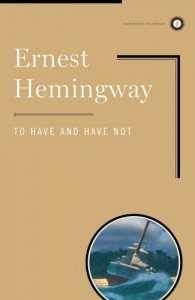Carissa Green Reads
I read widely from many genres. Perhaps this blog will feature fewer ratings and reviews, but I certainly intend to write about my reading life - it's the subject I most find myself wanting to talk about.
Currently reading
Notes on Adaptation: To Have and Have Not

This will be a combination "Notes on Adaptation" column and review of Hemingway's novel "To Have and Have Not."
Generally, I prefer a book to its movie adaptation. The reading experience is richer, deeper, and more personal than the viewing. Many films have credible adaptations; a smaller percentage are outstanding. The film version of Hemingway's "To Have and Have Not" is that rarest of things - the adaptation that is much, much better than its book.
The film is good. It's become part of film history and lore for being the place where Bogart met Bacall. She utters the famous line asking if "Steve" knows how to whistle. She smolders; he burns. It's all very delicious. The plot is "Casablanca" - lite. Just enough plausible intrigue to hold together an hour and a half of work by a good cast.
In addition to Bogart and Bacall, Walter Brennan plays a comic turn as a drunkard deckhand, and Hoagy Carmichael basically plays himself - a working musician. William Faulkner - yes THE William Faulkner - is one of the credited screenwriters.
But aside from the opening sequence when the American fisherman, Johnson, has his last day of bad luck on the boat captained by Bogart's "Harry Morgan" character, the film resembles the book in almost no other way. And that's its saving grace.
The book is set in the waters and taverns between Key West and Cuba in the 1930s at the height of the Great Depression. Its Harry Morgan is a fisherman turned rum-runner turned human smuggler on a bad luck streak. The film is set in the French Caribbean in 1940 and involves a reluctant Morgan smuggling Free French resistance fighters under the nose of the Vichy authorities (basically French Nazis).
The book, I'm sure, attracts most of its readers on Hemingway's reputation. And maybe I give it an extra star or half-star for that, too. But it's utter garbage, Hemingway or not. It's a racist, misogynist text. Badly edited, for a Scribner's book, full of misspellings and bad capitalizations and other errors. Cheap comedy is played at the wrong time. The book undergoes jarring point-of-view shifts, and in the final third of the novel, a whole bunch of confusing characters who have pretty much nothing to do with anything are introduced and carry what little story there is to the end.
What could have been a story of pathos of men living on the edge during the Depression is just an ugly mess. If you must read it, imagine all of Morgan's sections in Bogart's accent. It helps. A little.
If you want to tell me what you think, just whistle. "You know how to whistle, don't you?" (That's not in the book at all.)
-cg
 2
2








